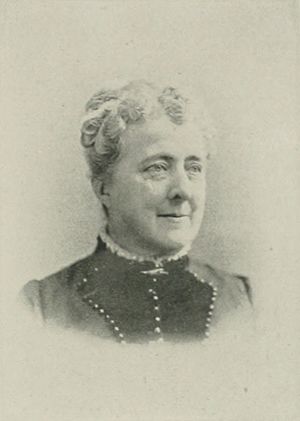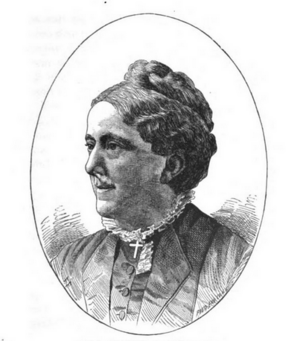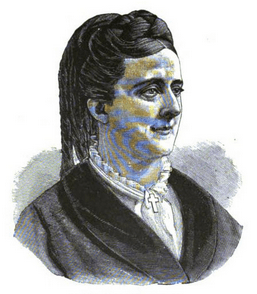Jennie Fowler Willing facts for kids
Quick facts for kids
Jennie Fowler Willing
|
|
|---|---|

from a book titled "A woman of the century"
|
|
| Born | January 22, 1834 Burford, Upper Canada |
| Died | October 6, 1916 (aged 82) New York City, New York, U.S. |
| Occupation | educator, author, preacher, social reformer |
| Language | English |
| Nationality | American |
| Alma mater | Evanston College for Ladies |
| Notable works | From Fifteen to Twenty-five: A Book for Young Men |
| Spouse |
William Crossgrove Willing
(m. 1853) |
| Relatives | Charles Henry Fowler (brother), Henry Ryan (grandfather) |
Jennie Fowler Willing (born January 22, 1834 – died October 6, 1916) was an important American woman. She was born in Canada but became an American citizen. Jennie was an educator, meaning she taught others. She was also an author who wrote many books. She worked as a preacher, a social reformer, and a suffragist. A suffragist is someone who supports the right for women to vote.
At 19, she married William Crossgrove Willing, who was a lawyer and a minister. In 1873, Jennie and her husband became professors at Illinois Wesleyan University. Besides teaching, she was a major leader in the temperance movement. This movement worked to encourage people to live healthy lives and avoid alcohol.
Jennie became well-known when she joined the Illinois Woman's State Temperance Union. She led this group for several years. She also helped start the first national meeting for temperance in 1874. This meeting, held in Cleveland, led to the creation of the National Woman's Christian Temperance Union (WCTU). Jennie was even the editor of the WCTU's national newspaper for a while. Later, in 1895, she started the New York Evangelistic Training School. Jennie wrote many books, including From Fifteen to Twenty-five: A Book for Young Men, and articles for newspapers.
Contents
Early Life and Education
Jennie Fowler was born in 1834 in Burford, which was then called Upper Canada. Her parents, Horatio and Harriet Fowler, had family roots in England, Scotland, and Ireland. Her grandfather, Henry Ryan, was a traveling minister.
When Jennie was two years old, she fell into a well. This accident caused her to have health problems for a long time. In 1842, her family moved to Newark, Illinois. Her brother, Charles Henry Fowler, was engaged to Frances Willard for a short time. Frances Willard later became a famous leader in the temperance and women's rights movements.
Jennie received an honorary university degree called an A.M. degree from Evanston College for Ladies in 1872 or 1873.
Jennie's Career and Work
Becoming an Educator and Writer
Jennie started teaching school when she was just 15 years old. The very next year, she taught a winter term at a village school. She took over after the older boys had caused trouble for the previous young male teacher.
In 1853, when she was 19, she married William Crossgrove Willing. He was a minister in the Methodist Episcopal Church. They moved to western New York. Being a pastor's wife meant she had many duties, which left little time for her own studies. However, she continued to learn about languages and science.
Jennie began writing for newspapers when she was 16. Besides writing many articles for papers and magazines, she also wrote two series for New York newspapers and published 10 books. In 1873, she was chosen to be a professor of English language and literature at the Illinois Wesleyan University. After this, she was involved with several other schools as a trustee or teacher. In 1874, she was considered for a high position in public education in Illinois, but she had to turn it down because of her other important duties.
Working for Social Change
Jennie had a strong desire to help improve society. This led her to join the temperance movement when it became very popular across the United States. For several years, she was the president of the Illinois Woman's State Temperance Union.
Jennie, along with Emily Huntington Miller, called for the big convention in Cleveland. Jennie led this meeting, where the National Woman's Christian Temperance Union (NWCTU) was officially started. She was also the first editor of the NWCTU's newspaper, which later became known as The Union Signal.
Her passion for temperance led her to become a public speaker. She spoke to huge crowds in many large cities across the U.S. As one of the secretaries for the Woman's Foreign Missionary Society, she talked about temperance at meetings for ministers. She also spoke in many towns, getting thousands of people interested in the work. She also served as the leader of the NWCTU's Evangelistic Training Department and was president of the Frances Willard WCTU.
For several years, she did similar work for the Woman's Home Missionary Society. As an evangelist, she led many large and successful religious revival services. After moving to New York City in 1889, she stayed busy with her home mission work and evangelistic services. She also worked with an Italian mission and a bureau for immigrants, which included a home for immigrant girls in New York, Boston, and Philadelphia. Jennie was also a leader in the women's suffrage movement in Illinois, fighting for women's right to vote.
Later Life
Jennie Fowler Willing passed away in New York City on October 6, 1916. She was a widow at the time of her death. She left her money to different charities.
Images for kids
See also
 In Spanish: Jennie Fowler Willing para niños
In Spanish: Jennie Fowler Willing para niños
 | James B. Knighten |
 | Azellia White |
 | Willa Brown |




